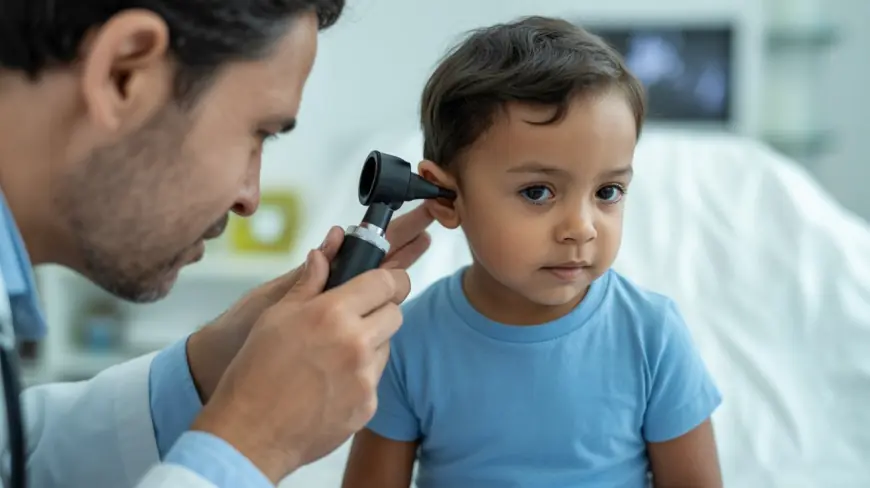Why Your Child Keeps Getting Ear Infections (And What You Can Do About It)
Learn why kids get repeated ear infections, common signs, prevention tips, and when to visit an ENT specialist for proper care.

Ear infections often affect children and are among the most frequent childhood illnesses. Many parents feel helpless when their child keeps crying from ear pain or constantly needs antibiotics. If you’re wondering why your child keeps getting ear infections, you’re not alone.
This blog will explain the reasons behind repeated ear infections and what steps you can take to reduce them.
What Is an Ear Infection?
An ear infection is a build-up of fluid and germs in the middle ear. The middle ear, which sits right behind the eardrum, is where these infections usually occur. The infection can cause pain, swelling, and sometimes fever or hearing issues.
They happen most often in babies and young children due to their still-developing immune systems and smaller ear structures. Their immune systems are still developing, and their ear structures are smaller, making it easier for germs to grow.
How to Tell If Your Child Has an Ear Infection
Children may not always say what hurts. Here are common signs to look for:
-
Tugging or pulling at the ear
-
Crying more than usual
-
Trouble sleeping
-
Trouble hearing or not responding to sounds
-
Fever (especially in infants)
-
Fluid draining from the ear
-
Loss of balance
If your child shows any of these signs, it's good to get them checked by a doctor.
Why Do Ear Infections Keep Coming Back?
1. Small Eustachian Tubes
Children have shorter and more narrow Eustachian tubes. These tubes connect the middle ear to the throat and help drain fluid. When they don’t work properly, fluid gets trapped and leads to infection.
2. Weaker Immune Systems
Young children have developing immune systems, so they can’t fight germs as well as adults. This makes them more likely to get sick repeatedly.
3. Allergies or Cold Weather
If your child has allergies or gets frequent colds, their nose and throat can swell. This blocks the ear tubes and causes fluid build-up, which can lead to infection.
4. Bottle Feeding While Lying Down
Feeding your baby while they lie flat can let milk or formula flow into the ear through the Eustachian tube, especially in infants under 6 months.
5. Secondhand Smoke
Exposure to smoke from cigarettes or incense can irritate the nose and throat, blocking the tubes and making infections more likely.
Home Care Tips to Prevent Ear Infections
You can’t stop every infection, but you can lower the chances with simple care:
Keep Your Child Upright While Feeding
Always hold babies upright during bottle feeding. This helps prevent fluid from entering the ear.
Avoid Pacifiers After Age 1
Long-term use of pacifiers can increase the risk of ear infections in toddlers. Try to limit or stop their use after 12 months.
Wash Hands Often
Many ear infections start after colds or other illnesses.Keeping hands clean by washing them regularly is a simple but powerful way to stop germs from spreading, which lowers the risk of infections.
Breastfeed If Possible
Breastfeeding provides natural antibodies that help your baby fight infections.
Keep Them Away from Smoke
Don’t allow smoking near your child. Even smoke on clothes can be harmful.
When to Visit a Specialist
You should see a doctor if:
If your child has had three or more ear infections in half a year, it may be time to consult a specialist for further evaluation.
-
They show signs of hearing loss
-
The infections are not going away with medicine
-
There’s fluid coming out of the ear
-
They are in severe pain or have a high fever
In these cases, your doctor may refer you to an ENT (Ear, Nose, and Throat) specialist. If you're looking for the best ENT hospital Kochi, choose a place that has child-friendly care, good equipment, and experienced doctors who understand pediatric needs.
Sometimes, children with repeated infections might need small tubes inserted in the ear. These tubes help drain fluid and prevent future problems.
What Can Parents Do Next?
Chronic ear infections are annoying because they can be treated and prevented. This is what you can do to get in control:
-
Monitor your child’s symptoms closely
-
Follow-up appointments are not to be missed
-
Do not take antibiotics early or self-treatment
-
Speak to your doctor about long-term solutions
-
Select a proper ENT care center to assess them
All children are unique. A few children have gotten out of the ear infections before they get to 5th age. An additional care may be required by others. Nevertheless, you may guard the hearing and the comfort of your child by taking the right measures.
What's Your Reaction?
 Like
0
Like
0
 Dislike
0
Dislike
0
 Love
0
Love
0
 Funny
0
Funny
0
 Angry
0
Angry
0
 Sad
0
Sad
0
 Wow
0
Wow
0
















































